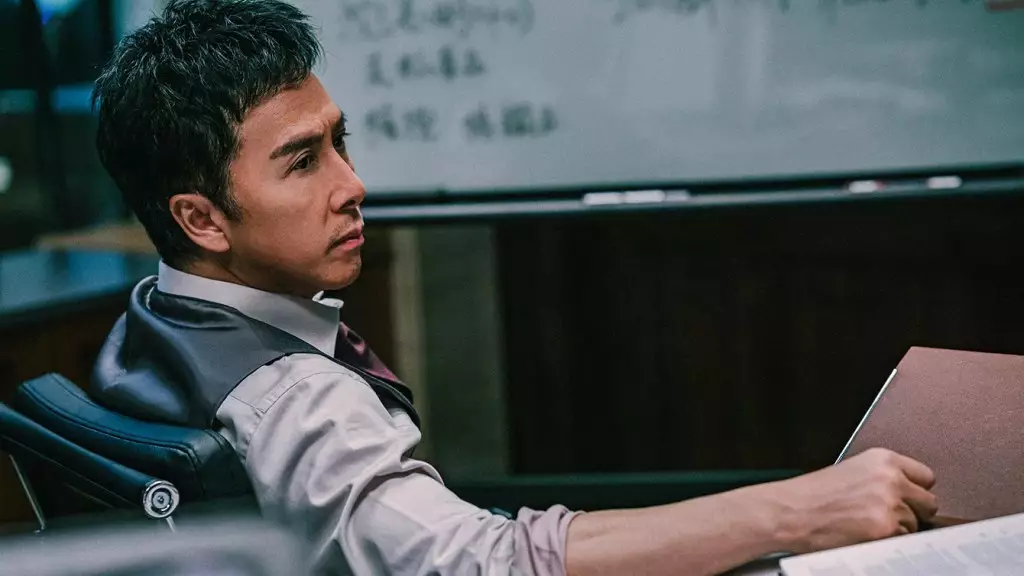Donnie Yen, a prominent figure in martial arts cinema, takes on a new venture in his recent film, “The Prosecutor.” Unlike his well-trodden path of martial arts-tinged action films, this legal drama reflects a significant narrative shift, placing Yen in a role that intertwines the intricacies of the legal system with moral dilemmas. In this film, he plays Fok Chi Ho, a cop turned prosecutor, embodying the struggles of someone disillusioned with a system perceived to be flawed. This transition might be seen as a courageous move for Yen; however, the execution raises critical questions about the film’s cohesion and the depth of its narrative.
While the premise offers an innovative angle for Yen’s character, the film often feels bogged down by its heavy emphasis on legal jargon and courtroom dynamics. Instead of showcasing Yen’s traditional action prowess, it fixates on a critique of the justice system, which can alienate long-time fans seeking his trademark martial arts sequences. The script, penned by Edmond Wong, attempts to present a story of redemption and righteousness but risks losing audience engagement in its dense exposition of legal intricacies.
The film seeks to anchor Fok as a relatable character—a man of the people, who eschews high society for the simplicities of life, like utilizing public transport and frequenting local eateries. These traits are crucial in constructing his moral dilemmas against the backdrop of a legal system that often prioritizes closing cases over true justice. However, this characterization, although appealing, has its limitations. Yen’s portrayal lacks the nuance expected of a protagonist navigating such complex ethical territory. Instead, he often leans into physicality, suggesting a disconnect between his characterization and the film’s thematic intentions.
Support from renowned actors like Francis Ng and Julian Cheung bolsters the film; their performances provide layers that might otherwise be absent from Yen’s more straightforward portrayal. However, they cannot fully compensate for the screenplay’s sometimes lifeless engagement with its subject matter. The film’s insistence on expounding legal terminologies and courtroom processes dilutes its dramatic tension, placing audiences at risk of losing focus. Thus, while Yen’s approach to the character is commendable, the film often sidelines the emotional stakes in favor of legal exposition.
The action sequences—hallmarks of Yen’s career—are notably diminished in frequency and intensity, with the film prioritizing courtroom battles over street brawls. While such a direction reflects a narrative maturity, it may leave many admirers of Yen’s early work dissatisfied. The strategically placed action scenes feel tacked on to keep the audience’s attention, lacking the organic flow characteristic of the best action-dramas. In utilizing secondary characters, like MC Cheung’s agile newcomer—cop Lee—Yen shifts the weight of physical confrontation away from himself, subtly hinting at an awareness of his age and the limits of his on-screen abilities.
The attempts at crafting action sequences, such as the initial high-speed shootout, are impressive but treated more as exceptions rather than the norm. The decision to employ techniques reminiscent of video games, such as a first-person perspective during action scenes, does inject a sense of immediacy, yet this concoction also brushes off the deeper emotional turmoil that Fok experiences. When the climactic moments occur—like the confrontation on a packed subway train—they result in a visceral yet somewhat routine showcase that leads to an abrupt reconciliation of Fok’s character arc.
“The Prosecutor” emerges as a reflection of the current socio-political landscape in Hong Kong; however, it sidesteps directly confronting the pertinent issues brought forth by recent legislation, such as the National Security Law. The film heavily emphasizes the importance of justice and the struggle to navigate a system that often feels untenable. Yet, it may unintentionally serve as a metaphorical critique rather than a nuanced exploration of its themes. Audiences may wonder about the implications of upholding justice in a context where it is becoming increasingly politicized and fraught with inconsistencies.
“The Prosecutor” offers a departure from the kinetic pulse of traditional martial arts films while daring to explore the legal realm through the lens of Donnie Yen. However, it often stumbles in delivering a balanced narrative that fuses action with emotional depth. By focusing deeply on legal processes, it risks alienating audiences unfamiliar with such terminology while not fully satisfying those who have come for Yen’s celebrated fighting flair. What emerges is a polished piece of entertainment that, while tackling relevant themes, disappointingly prioritizes ennui over exhilaration.

